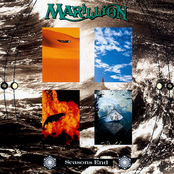Seasons End

Biography
Seasons End was the first album recorded by Marillion after the split with Fish in late 1988. The band started to audition singers while writing the new album, and they eventually chose Steve Hogarth. The music for Seasons End was mostly finished by the time Hogarth joined Marillion, and only a couple of songs on it actually have some pieces written by him, most notably "Easter" and "The Space". A number of the lyrics were written by John Helmer, who the band had commissioned before Hogarth join...
Seasons End was the first album recorded by Marillion after the split with Fish in late 1988. The band started to audition singers while writing the new album, and they eventually chose Steve Hogarth. The music for Seasons End was mostly finished by the time Hogarth joined Marillion, and only a couple of songs on it actually have some pieces written by him, most notably "Easter" and "The Space". A number of the lyrics were written by John Helmer, who the band had commissioned before Hogarth joining. He would continue to contribute lyrics throughout the 1990s. Much of the music on Seasons End had been composed while Fish was still in the band. The bonus disc of the 1999 re-issue of Clutching at Straws contains a number of nascent versions of songs that would end up on Seasons End with vocals and lyrics by Fish, these demos having been produced during the writing sessions for the ill-fated fifth studio album with Fish. (A number of the lyrical concepts from these demos, such as The Voice In the Crowd, would later resurface on Fish's debut studio album, Vigil In a Wilderness of Mirrors.) The album was produced jointly by Marillion and Nick Davis (who would go on to work with Genesis and associated acts). Coverart: As Mark Wilkinson, who had designed all previous Marillion covers, had left together with Fish, the album also marked a turning point in the band's visual style, towards a more "modern", photographic look created by Bill Smith Studio. The four square fields dominating the cover symbolize the four classical elements, earth, air, water and fire (clockwise from top left). At the same time, the cover contained some references to the past: It used the band's original logo, which had been replaced with a "modernized" version on the previous album Clutching at Straws and related releases as well as on B'Sides Themselves (although the 1988 live retrospective The Thieving Magpie also used it). The feather in the "desert" square is a reference to the image of the "magpie" found on Misplaced Childhood (1985), the "sky" square contains a fragment of the "Jester's" dress introduced on Script for a Jester's Tear (1983), the chameleon in the "fire" square appears on Script for a Jester's Tear, Fugazi (1984) and Misplaced Childhood; the painting with the clown's face falling into the water upside-down is taken from the Fugazi cover. Also, the vinyl version returned to the gatefold format that had been abandoned on the previous studio album. Lyrics: The lyrics on Seasons End, unlike on the two previous albums, are not tied together by a common storyline. The opener, "The King of Sunset Town", in John Helmer's original version, was about poverty; however, Hogarth modified it under the impression of the brutal oppression of the Tiananmen Square protests of 1989 by the Chinese government; the line "And everyone assembled here / Remembers how it used to be / Before the 27th came" refers to the 27th Army involved in the massacre [3]. "Easter" addresses The Troubles of Northern Ireland (a topic Fish had previously dealt with in "Forgotten Sons" in 1983)[4]; more indirectly, this also goes for "Holloway Girl", which refers to the imprisonment of Judith Ward in Holloway Prison for IRA bombings [5]. "Seasons End" addresses climate change (a topic Marillion lyrics would return to in 1998 and 2007) [6] - the spelling of the title is intentional, referring not to the end of a season (which would be "Season's End"), but the end of all seasons as a result of global warming eliminating winter altogether. "Berlin" describes the situation in the divided city of Berlin, where Marillion had recorded Misplaced Childhood; the Berlin Wall would eventually come down just weeks after the release of Seasons End Read more on Last.fm. User-contributed text is available under the Creative Commons By-SA License; additional terms may apply.

